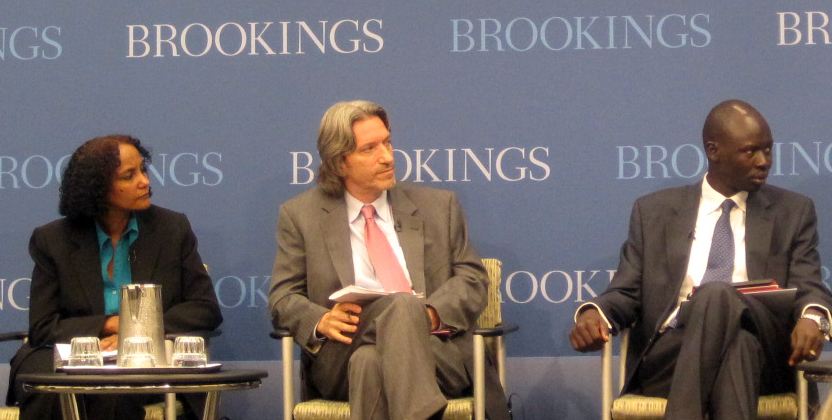
On June 28, the Africa Growth Initiative at Brookings invited a diverse array of prestigious activists and leaders from the U.S. and Africa, including Enough Project Co-founder John Prendergast, to discuss opportunities and obstacles for South Sudan as the country approaches its one-year anniversary of independence. While the panelists were cautiously optimistic about the progress Africa’s newest nation has made, many expressed concerns about South Sudan’s struggling economy and its remaining security challenges.
Other panelists included U.S. Special Envoy for South Sudan and Sudan Ambassador Princeton Lyman, founder of the Center for Strategic Analyses and Research Peter Biar Ajak, faculty member at the New School for Social Research Nada Mustafa Ali, and Senior Fellow at the Brookings Institution John Mukum Mbaku.
South Sudan’s struggling economy was a central focus throughout the discussion. Ajak, the founder of an independent policy think tank based in Juba, said that although there was a lot of excitement after South Sudan’s independence, there is now a sense of “economic anxiety.” This anxiety is based on South Sudan’s decision in January to shut down its oil production after Sudan confiscated what South Sudan calculates to be $815 million worth of oil. South Sudan President Salva Kiir described the decision as a means of protecting national property, but its effects are felt at home since oil accounts for 98 percent of South Sudan’s budget.
Although the panelists acknowledged the detrimental effects of this oil shutdown, Ajak noted that now South Sudan has an opportunity to find other sources of revenue and diversify its economy. However, Ambassador Lyman cautioned that this economic shock will force South Sudan to shift resources away from development for more immediate relief, which could be detrimental for long-term development projects.
The panelists expressed concerns about South Sudan’s security challenges. One year after its independence, Prendergast identified three major security concerns that are affecting the country and the region at large: conflicts within South Sudan; disputes between South Sudan and Sudan; and conflict within Sudan.
In terms of conflict within South Sudan, Prendergast said that after independence many assumed the “fissures and fault lines in South Sudan would be deepened.” Although incidents of internal conflict have not been widespread, this assumption proved true in the eastern state of Jonglei, where inter-communal violence affected thousands of civilians. Nada Mustafa Ali, who conducted research on women’s rights in South Sudan, also noted that Jonglei’s conflict led to an increase in gender-based violence.
Regarding the long-standing conflict between Sudan and South Sudan, panelists were relieved that an all-out war has not broken out between the two countries, but expressed concern about the sluggishness of negotiations. Ambassador Lyman noted that key security issues like border demarcation and the status of Abyei still have not been resolved, impeding the opportunity for sustainable peace between the two countries.
Prendergast said:
With the failure of the Comprehensive Peace Agreement to deliver a number of the central points for broader peace—failure to deliver democracy, failure to deliver some semblance of a political process for the people of Blue Nile and South Kordofan, failure to deliver resolution of the very major issues that continue to divide Sudan and South Sudan—I think we’re seeing, perhaps controversially, the beginning of the end: the failure of the model of negotiated peace as the international community’s primary means of dealing with Sudan. The faster we acknowledge that, potentially the more we can move forward in a more constructive way.
Most security concerns that the panelists raised were centered on South Sudan, yet Prendergast maintained that it is Sudan that we should be anxious about. He said, “The world spent all its time worrying about an independent south, and now the north is exploding.”
With the recent anti-regime protests and conflicts in South Kordofan and Blue Nile, the international community should be concerned about Sudan’s role in the stability of the region. Prendergast argued that a process must be put in place for resolving Sudan’s internal conflicts, or the entire region will be affected.
Photo: Several of the panelists at the Brookings' South Sudan event on June 28. From left to right: Nada Mustafa Ali, John Prendergast, Peter Biar Ajak. (Marjon Momand/Enough Project)

